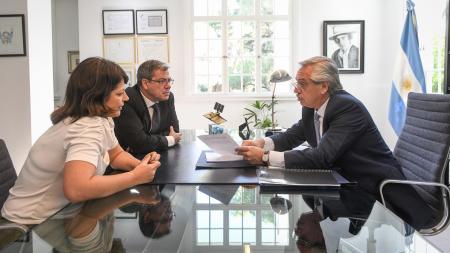President Alberto Fernández intends to expedite the impeachment process against the Supreme Court of Justice through a call for extraordinary sessions in the Chamber of Deputies for the second half of this month.
The impeachment request will reach Horacio Rosatti, president of the highest court, and the ministers Carlos Rosenkrantz, Juan Carlos Maqueda and Ricardo Lorenzetti, who are accused by the Executive of incurring bad performance and partiality.
The call for extraordinary sessions It will come out “next week,” announced the spokesperson for the Presidency Gabriela Cerruti, and the request for impeachment “will be part of the agenda,” other officials with offices in Casa Rosada reaffirmed to Télam.
The initiative that promotes this removal process will address two issues and the first is the declaration of unconstitutionality of Law 26,080 that governed the operation of the Council of the Magistracy for 16 years and that was replaced, by decision of the Court, by the repealed Law 24,937.
That decision of the Court, described as “an unusual event” by Cerruti in the first press conference of the year that he offered last Thursday at the Government House.
Another issue to consider is the precautionary measure that restored co-participating funds to the City of Buenos Aires (CABA).

In this case, the official assessed that the highest court “violated the division of powers” as it was an issue “that must be resolved in the National Congress or in the Executive Branch, because it is something that involves all the provinces.”
“I must prevent the Council of the Magistracy from continuing to be manipulated with unusual jurisprudential interpretations that allow the Judiciary to meddle in the decisions of the National Congress“, indicated the President when announcing on the first day of this year his decision to initiate the impeachment trial.
And regarding the ruling that benefited the Buenos Aires district, the head of state indicated that his duty was to “promote actions when the federal system is put into crisis through an unnecessary precautionary measure and the improper proposal of an autonomous city.”
The President based his proposal through the Article 53 of the National Constitutionwhich provides that the Chamber of Deputies “exercises the right to impeach the president, vice president, the chief of the cabinet of ministers, the ministers and the members of the Supreme Court before the Senate, in cases of responsibility that are attempted against them , for poor performance or for crime in the exercise of their functions”.
Fernández had the support of 11 governors: Axel Kicillof (Buenos Aires), Raul Jalil (Catamarca), Jorge Capitanich (Chaco), Mariano Arcioni (Chubut), Gildo Insfran (Formosa), Sergio Ziliotto (The Pampa), Ricardo Quintela (The Rioja), Alice Kirchner (Santa Cruz), Gerardo Zamora (Santiago del Estero), Gustavo Melella (Land of Fire) and Osvaldo Jaldo (Tucuman).
In addition, the lieutenant governors of the Norte GrandeRubén Dusso (Catamarca), Florencia López (La Rioja), Carlos Silva Neder (Santiago del Estero), Sergio Mansilla (Tucumán), Analía Rach Quiroga (Chaco) and Eber Solís (Formosa) also supported the initiative agreed between the President and the provincial leaders and asked Parliament that “institutions be reestablished” so that they are “guarantors of the Republic”.

other governors, Gustavo Saenz (jumps), Arabela Carreras (Black river), Omar Gutierrez (Neuquen) and Oscar Herrera Ahuad (Missions), there were questioned the ruling of the Court that ordered the Government to allocate 2.95% of the volume of co-participating taxes to CABA but did not rule on the impeachment request.
This week, the head of state met with German Martinezpresident of the Block of Deputies of the Front of All (FdT) and with the national deputy Caroline Gaillardpresident of the Impeachment Commission.
Fernandez made them delivery of the impeachment request to the members of the Supreme Court that he promoted together with the aforementioned governors, and asked them to begin “their prompt legislative treatment.”
Martínez himself assured that “more and more consensus” will be achieved as progress is made in the political trial and called to “vindicate the political decision of the President and the governors” since “they are thinking of the general interest and of the provinces that are harmed by the subjugation of the Court in other powers”.
Other support for the impeachment initiative was given by the block of senators of the FdT of the Buenos Aires Legislature and the mayors grouped in the Argentine Federation of Municipalities (FAM).

The former warned that “the rule of law and the division of powers established by the Magna Carta are under threat” and cited the ruling for the co-participating funds to CABA and the leak of alleged private chats between the Buenos Aires Minister of Security and Justice Marcelo D’Alessandro and the court official Silvio Robles.
“Both events of very high institutional gravity call into question the ‘presumed’ independence of the Judiciary, the neutrality of its rulings,” they indicated, and that they particularly affect “the independence of the judges who make up the nation’s highest court of justice.” .
While the mayors of the FAM considered that “There are multiple facts that prove the poor performance of the members of the Court” and they objected on the part of the highest court “the extraction of resources from the provinces in an illegitimate and arbitrary manner and the discretionary management of the Judiciary to the detriment of the representative, republican and federal system provided for in the National Constitution.”
From the FAM they pointed out that the magistrates “arrogated powers of the Legislative Power, by determining by ruling the percentage of participation of the City” and said that “they took the Council of the Magistracy by assault to plunge it into a historical paralysis, since they only met twice in six months.”















